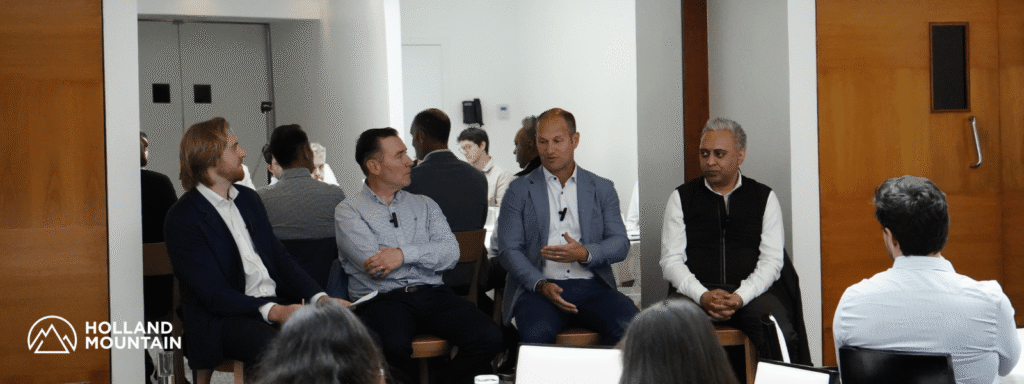Holland Mountain hosted a breakfast seminar in central London focused on how private equity firms can effectively action their data strategy.
On stage were senior leaders who are spearheading data strategy initiatives within their firms:
- Lyndon Arnold, CTO, Triton Partners
- Stephen Simmons, Head of Data and Reporting, H.I.G. Capital
The session was co-moderated by two associate directors at Holland Mountain, Billy Dix and Amardeep Singh.
Designed to be as practical as possible, the discussion centred around real-world lessons, pitfalls, and actionable advice for successfully deploying a data strategy in Private Capital.
1. How to successfully launch a data strategy?
Data strategies can feel abstract, especially to senior stakeholders who don’t see the hidden effort behind every dashboard or report that lands on their desk.
That’s why articulating a clear strategy is so important in order to create value, secure investment, and drive alignment across the business.
It’s complex and expensive, so you need a clear ‘why’.
“It’s going to be difficult and expensive. So, you need to know why.”
A strategy helps justify investment by linking data to real outcomes like faster deal sourcing, better fundraising, or more efficient operations.
Use cases are your best argument.
‘Data governance is boring. But if you link it to what the business actually cares about, like automating investor reporting, they’ll see its value.’
To build momentum, tie your strategy to specific use cases: automate a key report, clean inconsistent data, or standardise terms.
Despite the challenges, the market is moving, don’t fall behind.
‘If you don’t go on that journey… you can be sure your competitors will.’
Investors expect real-time insights and operational excellence. Firms that invest in data will also be better positioned as AI adoption accelerates.
Expect complexity, set the tone early.
‘Getting in a room to hash it out’ can take weeks.
The effort is often invisible to leadership, so be clear about what’s required from the start and ensure outcome-driven success criteria are properly communicated.
You need champions, and peer pressure helps.
‘Use your peers… your consultants… to tell the story.’
Internal advocates in the business and external benchmarks are often critical to winning support and sustaining change.
2. Big Bang vs. Use Case-Driven Data Strategy
When it comes to implementing a data strategy, firms often face a key strategic decision: take a “big bang” approach or build incrementally through use cases.
While the panel leaned heavily towards the use case-driven model, the discussion acknowledged that real-world constraints – like legacy system decommissioning or major vendor shifts – can occasionally justify a broader rollout.
Regardless of the approach, managing scope, stakeholder expectations, and cultural change remains critical.
Use case-led is the default, but even small use cases are hard.
‘Even trying to get down to a narrow use case can be very challenging’.
Data is interconnected, and a simple use case (e.g., LP-level IRRs) often cuts across systems, teams, and naming conventions. Big bang approaches tend to deliver too little, too late, “a pretty data model nobody cares about.”
Get the plumbing right before building analytics.
‘We had six or seven different IRRs for the same portfolio company’.
To unlock enterprise analytics and operational reporting, start with mastering core data – CRM, fund admin, HR, portfolio monitoring. A centralised, consistent data foundation prevents duplication and misalignment across teams.
Avoid the data swamp, governance is key.
‘Not another field in the CRM…’
Preventing data sprawl means saying no to unactionable requests and assigning value to each new field or report. BI tools can help reduce proliferation, but prioritisation and discipline – especially around operational vs. enterprise analytics – remain essential.
3. The Importance of Demonstrating Value
A data strategy will only succeed if it delivers visible value, which in turn drives the buy-in required to continue along the journey.
The panel agreed that building internal momentum is not just about implementing technology but about proving its worth in tangible and intangible terms.
That requires clear ROI thinking, visible impact across teams, and strong communication to stakeholders who may otherwise struggle to understand the purpose of the investment.
You need evangelists inside the business.
‘We spend our life telling portfolio companies to be data led, but internally, much less so’.
Change is more powerful when it comes from respected internal figures. Senior stakeholders, like a data-driven sector lead or a CFO using real-time data, can champion the message, demonstrate real impact, and motivate their peers.
ROI must be tangible and team-specific.
‘You do not just put something in your shopping basket for fun.’
Frame value in ways that resonate with each function. For the CFO, it may be cost reduction. For IR, faster or more targeted outreach. For portfolio teams, fewer reconciliation errors. Do not rely on them to define the value for you – bring forward clear measures that match their goals, utilising expertise from the market and your network.
Communicate both tangible and intangible returns.
‘You can avoid 10 or 20 million in broken deal costs’.
Savings, automation, and reduced headcount scaling are easy to quantify. But cultural change, improved decision-making, and reduced deal risk are equally important as they are hard to quantify. Position the program as low-cost relative to these outcomes and communicate its long-term strategic value.
4. Making Data Governance Work
Data governance often suffers from a reputation problem. It is seen as bureaucratic and compliance-driven, rather than as a value enabler.
The panel challenged this perception and reframed governance as a necessary part of embedding a data-driven culture. It is not just an IT responsibility or an optional process layer, but a business-led, people-centric function that underpins reliable, scalable use of data across the firm.
It is a business problem, not an IT problem.
‘The business owns the data, not IT.’
Governance is ultimately about change management and cultural ownership. IT enables the flow and storage of data, but accountability must sit with the business functions that create and consume it.
Assign clear data ownership by function.
‘It can be as simple as going to heads of department and asking, can we agree you are responsible for this data?’
By naming business owners for each structured data domain – HR, portfolio data, general ledger – firms can avoid ambiguity and drive accountability.
Do not outsource the role of data governor.
‘Culturally, it sets the wrong tone.’
While consultants can help define frameworks and best practices, the ongoing responsibility must sit inside the firm. Start with less than 1 FTE focused on this, and grow as needed – Data Governors can often help support change programmes as part of the wider strategy as you grow.
Show business users they will gain control, not lose it.
‘This already happens, just in spreadsheets – with a lot of manual effort and associate risk.’
When people understand that centralising data gives them more visibility and influence – not less – they are more likely to engage. Widespread use also drives faster error detection and creates self – correcting feedback loops.
5. The Role of AI in Data Strategy
AI was not the focus of the panel – but that was part of the point. While expectations around AI are high, the panel emphasised that AI is not a replacement for a data strategy or data platform.
Instead, it should be seen as a catalyst: a way to unlock more value from well-managed data and to accelerate certain tasks, especially around ingestion and automation.
AI is not a substitute for data strategy.
‘AI is not going to replace the need for a data strategy or a data platform.’
Without clean, well-structured data, AI cannot deliver reliable insights. Investments in AI should reinforce, not replace, the need for foundational data infrastructure.
Opportunities lie in unstructured data and ingestion.
‘There is a big opportunity for AI on data ingestion.’
AI can help extract data from unstructured sources – credit agreements, DDQs, fund docs – and improve inbound data quality at scale.
Expect acceleration, not full automation.
‘There is always going to be a human in the loop.’
While AI may speed up tool implementation and reduce manual tasks, accuracy thresholds and judgment still require human oversight – especially in financial and operational contexts.
Final Advice: The Importance of the Right Partner
Choosing the right partner – one who understands the private equity industry – is critical to getting it right.
Firms need more than a technically capable vendor. They need a partner who can:
- Navigate the nuances of private capital operations
- Design outputs that make sense to investment teams, IR, finance, and operations
- Spot issues before they reach the business, protecting credibility and trust
As one panellist put it, ‘You can lose the business quickly if you put nonsense in front of them.’ That means every chart, field, and dashboard must reflect the reality of how your firm operates, even if it is not perfect.
When a partner brings both technical expertise and sector insight, they become a force multiplier – accelerating progress, improving adoption, and ultimately helping your firm unlock the full value of its data.
Holland Mountain: your data strategy and technology partner.
Whether you’re just starting your data journey or looking to optimise your current approach, Holland Mountain can help.
Our advisory team designs and delivers firm-wide data strategies, while our data platform, ATLAS, provides the capabilities to power them.
Book a call with our team to explore how we can support your firm.






